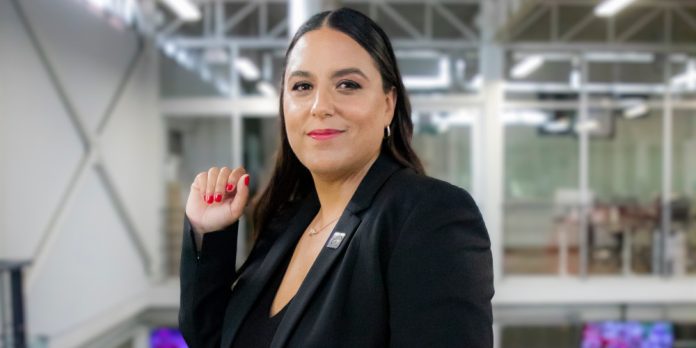With a population of 129 million inhabitants, the strongest economy in Latin America and the third largest on a continental level, Mexico represents an unparalleled opportunity if the engagement of sports fans is also considered.
Although it would be easy to assume that in such a large country the distribution of the gaming market would be shared among several companies, experience has shown that there is no country in which domination is as clear as in the case of Mexico and Caliente.
Not only does the company dominate the local gambling market, but it also does it in the sponsorship area, in a league considered the second most valuable on a continent level, only behind Brazil’s Brasileirao.
Out of 18 Liga MX teams, 14 feature the gambling giant’s brand on their jerseys. It is no mere coincidence that Caliente has hit this unparalleled milestone: it’s the result of a carefully planned and defined roadmap of a marketing team looking to expand and sustain a brand’s growth.
Fernanda Sainz, Caliente Interactive’s CMO, has been instrumental in establishing the company as one of the leaders in the continent. She joined in 2014 as a consultant, and a year later she was formally invited to be part of the company to launch operations in Mexico.
Intelligence, courage, and resilience are the three words that describe Caliente’s journey in the industry in recent years, according to Sainz. With only six people launching this business, Caliente now has over 200 employees.
“[I chose] ‘intelligence’ because we had to be very strategic in understanding when, how, and with whom. From creating alliances with providers, media, payment methods, the government, football teams… A lot of research was done before launching,” she explained.
In regards to “courage”, Sainz assured that they were the first company to bet on building an online betting market, even when the feedback strongly suggested that “Mexico wasn’t ready”.
As for “resiliency”, she said: “We had to be patient and resist competition from international brands that weren’t regulated and didn’t play by the same rules. We educate the media and football teams about the industry, demystifying myths and taboos that initially closed their doors on us.”
To establish and stay current in the industry, it was necessary for Caliente to completely understand the local market and get into the consumer’s DNA.
“Let’s not forget that before Caliente, other international online gaming companies, mostly Europeans, entered Mexico and wanted to replicate what they were doing on their continent in this country and it didn’t work. You can have the international brand and a good platform, but if you don’t understand your market perfectly, you won’t be able to deliver ad hoc products,” she said.
Is Caliente an example for other companies that aspire to be a powerhouse in Latin America? For Fernanda Sainz, it definitely is, as they were somewhat pioneers in Mexico and really opened up the local online betting market, which forced them to learn “many lessons” along the way.
“In terms of time and resources, and to educate the market about online betting, being leaders was also costly for us,” she commented, noting that Caliente has also learned from other companies in the region, such as some from Colombia.
“We’re still in a very young market, constantly learning about other markets, and exchanging experiences,” she assured.
In jurisdictions where a lot of progress has been made in such a short time, like in some in Latin America, Sainz believes that to acquire market share, the market needs to be well regulated. Additionally, companies must be well established in the country, knowing not only the regulation but also the preferences and routines of local players.
“This doesn’t just apply to Latin America, it’s the same in every country. For example, American sports are important in Mexico, but for Colombia, they’re less relevant.”
Competitiveness in Latin America
When it comes to roots, it’s very difficult to explain the Latino feeling to anyone who is not from the region. Likes, preferences, actions, feelings, interpretations. All these things are different when the Latin American public is involved. What works in international developed markets can easily fail in Latin America, while what often has no relevance in continents such as Europe or Asia, and even in Anglo-America, can lead to resounding success in this region.
In Spain, the Royal Decree introduced restrictions for the gambling industry, prohibiting sponsorships between bookmakers and football clubs. In the UK, there is mounting pressure to part ways with an industry that is very much a part of local football. However, all the clubs in those countries have survived or will survive the consequences of losing this revenue source.
Going back to explaining the Latin culture, local intricacies lead to these characteristics being completely involved in the rise and fall of different businesses. When it comes to sponsorships, having a gaming or betting brand on a jersey validates both the industry and the company itself.
Not only that, but many times sporting or organizational success depends on how much these companies invest in sport. It’s no coincidence that Liga MX is one of the most powerful ones in America, nor is it a coincidence that it has some of the most relevant players in the world.
In regards to positioning itself in a country like Mexico, where football or sports sponsorships and bookmakers are intertwined, Caliente said it’s been “very important” to be the main sponsor of most of the first division teams to become the leading brand in the local betting market.
“For us, the relationship with football is essential, because we set that in our strategy from the beginning. For Caliente, the DNA of the brand is football. We want to be the leading football brand in Mexico, and that relies a lot on the strategy of each company,” she said.
However, she warned that “constantly sponsoring teams is not a golden rule, as it strongly depends on your marketing strategy.”
On competitiveness, Sainz said that “sponsorships are a strong long-term investment, where you do not see an immediate ROI”, so “you really have to be careful in selecting them if it doesn’t follow a mix strategy of marketing that makes sense since it is not about arriving [to the market] and sponsoring just for the sake of it and for competing [with other brands].”
How do these agreements contribute to promoting clubs at a local and regional level? And to the women’s Liga MX Femenil?
“Significantly. We’re currently the main sponsor in Mexican football and we contribute to this sport because we inject capital that leads to better finances for the clubs, better contracts, and, therefore, a better show,” said Sainz.
“In regards to the women’s league, we’re the first sponsor that separates a budget and financially supports the Liga MX Femenil. This translates to better salaries and to the overall growth of the league, which has improved significantly.”
Caliente also provides clubs with stats and content: “Betting and sports have a perfect symbiotic relationship: there are international studies that show that when data, statistics, and of course odds and bets are involved, there is greater engagement from the fan, and therefore more interactions, more interest and more time spent in this activity.”
To ensure the success of the relationship between betting and sports, it is essential to have a correct responsible gaming framework, something that Caliente is very clear about and an area where it is highly committed.
“Caliente.mx wants its players to engage in responsible gaming. We advise all of our players not to play unless they know the facts. Being responsible means knowing how and when to play. We have trained staff ready to detect issues or problem gambling, and to provide options such as questionnaires, tips, and self-exclusion tools,” she said.
When asked about the approach that Latin America is taking on this segment, Sainz said that she considers it’s the right one: “There are more and more countries that are regulating online betting activity, and said regulation means that all the actors involved comply with fair and responsible gaming.”
Looking ahead to the FIFA World Cup, Mexico has been selected with Canada and the US as the host nations for the 2026 edition. Although it remains to be seen how the Canadian industry will develop and the heights that the US markets could reach, the reality is that Mexico continues to be the most established country in terms of sponsorships, meaning that there is a possibility that it will be the one that will benefit the most in the coming years, compared to the other two countries.
“Undoubtedly, we’re a football country. We’ll experience a boom, both because we have local games and because the schedule facilitates betting. We’re sure that we’ll take advantage of it, I have no doubts.”
This feeling of confidence around the local gambling industry wasn’t echoed in the sports industry, since when Sainz was asked about her predictions for the World Cup winner and the countries that will reach the final rounds, she decided to exclude Mexico.
“I think that Argentina, Belgium, Brazil, France, and Germany will be in the final rounds. And this time I feel that France will be the winner, although I would like Argentina to win the World Cup for Latin America and because of Messi.”















